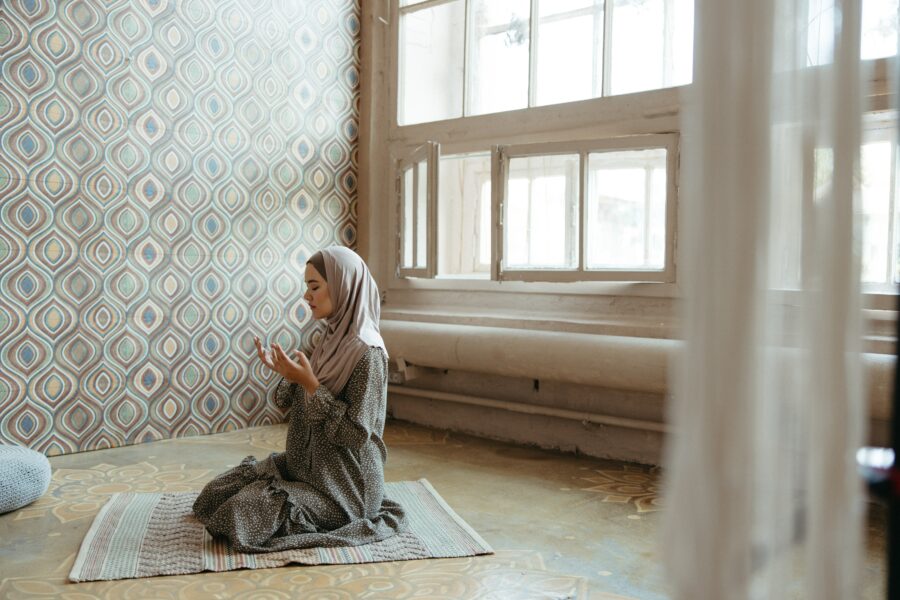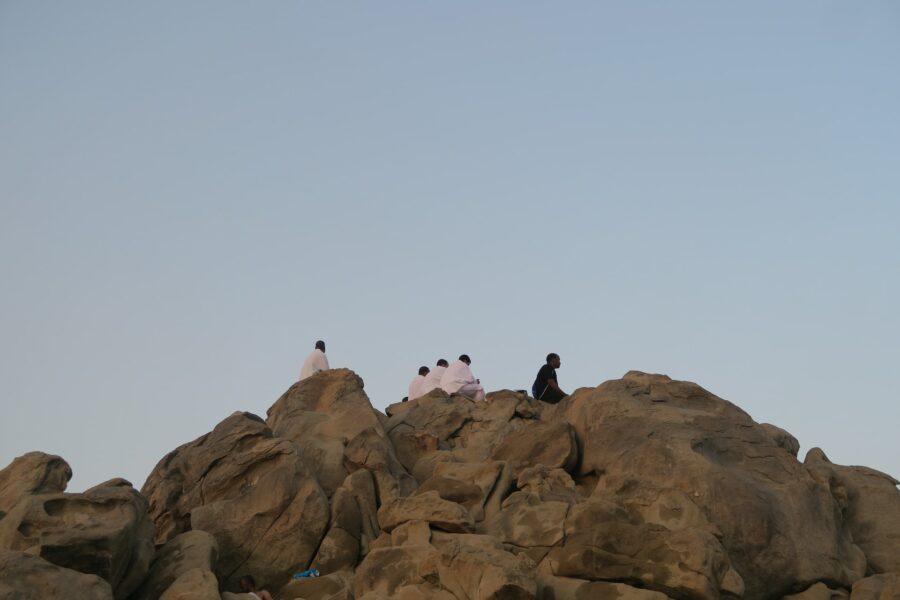Your 6 Step Plan to Acing Arafah
In less than 12 hours we will witness a day the Prophet (saw) described as having no equal in the sight of Allah: the day of Arafah.
Arafah, the 9th day of Dhul Hijjah, is a day of immense sanctity and virtue, the day millions of believers are forgiven by God and freed from the Fire. It is the climax of the Hajj pilgrimage, where pilgrims gather at the mountain plain of Arafah every year to beseech God’s forgiveness at the site of the Prophet’s (saw) final sermon after completing Hajj, near the end of his life. Many of us may be unable to make the journey of a lifetime, yet there are still immeasurable rewards to accumulate on this auspicious day from the comfort of our own homes. Wherever you are in the world, the day of Arafah is for you.
We all know the secret to success is planning! So we bring you ‘Your 6-Step Plan to Acing Arafah’ to ensure you don’t miss out on a day that Anas (ra) said is equal to 10,000 days in virtue.
This 5-minute read will help guarantee that once Arafah ends and Eid begins, you won’t have any regrets.
1. Fast the 9th
Even if you have been unable to fast on any other Dhul Hijjah day, then fasting on the 9th is the perfect opportunity for you to reset the balance. Not only because you are fasting in the best days of the year, but because of the specific virtue of the 9th. The Prophet (saw) told us that fasting this day “expiates for the sins of the previous year and of the coming year.” (Muslim). Imagine, a single day can wipe out 2 years of our shortcomings! What an immeasurable blessing it is!
To make sure you are fully prepared for this fast, it is encouraged to wake up for Suhoor. This will help equip you both spiritually and physically. Give your body nutritional food to provide you the stamina you need to complete your fast. It doesn’t have to be a decadent meal, which takes hours to prepare. In fact, the Prophet (SAW) told us: “The best suhoor for the believer is dates.” (Abu Dawud)
If having two years of sins forgiven isn’t enough to motivate you to fast, how about this:
Allah (SWT) said: “Every deed of the son of Adam is for him except fasting; it is for Me and I shall reward for it…” (Hadith Qudsi, Bukhari & Muslim)
Don’t waste this opportunity by being unprepared. Encourage your friends and family to join you on this fast, so that you can motivate each other during the day.
2. Call on Him
Even if we have been unable to perform hajj, the reality is we are able to call on Him, from wherever we are in the world. We do not need to depend on planes to transport us to a specific country, or a certain time zone. We can make du’a from the privacy and safety of our own homes.
On this blessed day, ask Allah (swt) for forgiveness, and call on Him, as the hujjaj (pilgrims) do every year. Follow the footsteps of the Prophets and make du’a on the best of days when He is especially close to us!
“The best of dua is dua on the Day of Arafah, and the best that I and the Prophets before me said is, ‘Laa ilaaha ill-Allaah wahdahu la shareeka lah, lahu’l-mulk wa lahu’l-hamd wa huwa ‘ala kulli shay’in qadeer [There is no God but Allah alone, with no partner or associate; His is the dominion, to Him be praise, and He has power over all things].” (At-Tirmidhi)
To ensure you don’t forget to ask for the best of this life and the next, get your favourite du’a books to hand and have your du’a list prepared the night before!

3. Remember Allah
On this day, we aim to seek the pleasure of Allah by fasting, making du’a and asking for forgiveness. However, real remembrance of God is embodied in our actions. We should also spend the day refraining from that which is displeasing to our Creator. These faults that we easily fall into but we often overlook can taint our fast.
We should purify our tongue by staying away from backbiting, lying and profanities and instead keep our tongue moist by reciting His Book, and with takbeer (Allahu Akbar), tahmeed (Alhamdulillah), tahleel (Laa ilaaha ill-Allah), and tasbeeh (SubhanAllah) whenever and wherever you can.
We should also control our sight, and hearing; by avoiding anything forbidden for us, lowering our gaze and listening to that which is beneficial.
“The Day of Arafah is a day that one
controlling his hearing, sight, and tongue will be forgiven.” (Ahmad)
We should make the effort to fill our day with good
deeds, and go the extra mile in making sure we are pleasing Allah (swt) by
doing what He loves and abstaining from what He dislikes.
Allah (SWT) says: “Therefore remember Me. I will remember you.” (2:152)
And who doesn’t want to be remembered by Allah (SWT)?
4. Fulfil the rights of brotherhood
Whilst Muslims may yearn to be on the plains of Arafah, this year we have no option but to tirelessly seek the rewards of this day from our homes. One of the ways you can reap the benefits is by supporting others, and fulfilling the rights of our brothers and sisters who are struggling silently.
“Whoever missed out on the standing at ‘Arafah; then let him stand for Allah in regards to His rights in that which he is aware of.” (Ibn Rajab)
Indeed Ibn Abbas, the companion of the Prophet (saw) said that,
“To fulfil the necessities of a Muslim family for a month, or for a week, or for whatever period of time that Allah pleases, is more beloved to me than performing Hajj after Hajj.”

Hundreds of families who have been affected by counter-terror measures and detention in the UK are depending on your support.
Fulfil their rights on this blessed Day of Arafah by providing for single mothers and their children. Gift your Qurbani through HHUGS and have an impact.
5. Gift Sadaqah
The companion of the Prophet (saw), Anas, said that, “The Day of Arafah equals 10,000 days in virtue.”
Imagine the reward then of giving in charity on such a prestigious day.
Giving charity is also known to make up for our shortcomings in our fasts and to extinguish our sins – so what better deed to perform to seal our actions on a day we are desperately seeking our Lord’s Forgiveness?
You can do this by gifting your Qurbani to single mothers who live amongst us, unable to feed their families, in honour of Prophet Ibrahim (as) and his obedience to Allah (swt).
By giving in charity, you will be reaping the rewards of an act that will benefit you long after you are gone.
The Prophet said: “When a person dies his works end, except for three: ongoing charity, knowledge that is benefited from, and a righteous child who prays for him.” (at-Tirmidhi)
6. Seek Forgiveness
We are often left feeling helpless when we ponder over asking for forgiveness, as we fear our deeds weigh too heavy on the scale. However, one of the greatest injustices we can do to Allah (swt) is believing that we are undeserving or unable to ask for forgiveness.
We are reminded of the mercy of Allah (swt), no matter how great our sins. Despite our shortcomings, Allah actually turns to us and seeks out those beseeching Him on this day:
“As for the standing at ‘Arafah: Allah the Almighty descends to the lowest heaven [On that day] , and boasts about you to the angels, saying: ‘Here are My slaves! They have come to Me with dishevelled hair and with pale faces seeking My Mercy and Forgiveness. If your sins are as many as the grains of sand or the drops of rain or [as much as] the foam on the sea, I would forgive you. Go My slaves after being forgiven, and after the ones whom you asked forgiveness for have been forgiven.” [Ibn ‘Abdul-Barr]

On the day where Allah (swt) frees those even who are not physical in Arafah, will you open your heart to seek Allah’s mercy and ask for forgiveness?
“On the day of Arafah, Allah frees (from the Fire) even those who are not physically in Arafah. Therefore, the next day is Eid for all” (Ibn Rajab)
We’re blessed to have been chosen to be among those who are alive on this virtuous day. Others have not been granted this opportunity. Many of us have lost loved ones in the past year, reminding us of the fragility of life. We should use these reminders to make the most of the time we have been given.
So let us grab this gift that been bestowed upon us! Increase your good deeds, ask for forgiveness wholeheartedly and make an intention to re-start your life from this day, to rid yourself of any habits that are displeasing to Allah. Fulfil the rights of your brothers and sisters, and continue to strive beyond this blessed day of Arafah. We should not forget that the day of Eid holds virtue in itself as one of the ten days of Dhul Hijjah, and should strive to continue to reap the rewards on this day too.
We pray Allah accepts our supplications on this day, that He accepts our fasting, our adhkaar and our charity. We pray that He forgives us and liberates us from the Fire, and that He grants us an opportunity to stand on the plains of Arafah next year, joining millions of others in seeking His Pleasure alone.